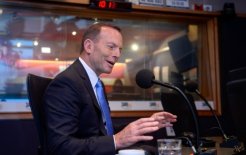Leading from behind
Once again, the public has had to shame its leaders into doing the right thing

Recent Blogs
Advertisement
From the front page
Not everyone could turn a humanitarian gesture into an opportunity for sectarian bigotry. Somehow, the Abbott government has managed it, marring the announcement that Australian will give permanent asylum to 12,000 Syrian refugees with insinuations that Christians may be more worthy of protection than others (that is, Muslims).
But it had already been a very strange fortnight. We’re accustomed to politicians on the defensive about refugees – but not like this. Suddenly, they’re under pressure, not for admitting asylum seekers but for refusing them.
In both the UK and Australia, conservative prime ministers have been forced to act, under pressure from the public, in the media and within their own parties. If they don’t act, they risk seeming out of touch. Even Murdoch’s Sun has called for action, with a front page screaming, “It’s life or death.” Not so long ago, that same paper ran a headline: “Halt the asylum tide now!”
The change in sentiment is welcome, albeit somewhat disorienting, for refugee campaigners. For more than a decade, political insiders assured us that the population hated refugees.
That was the explanation for Australian immigration policy: the deep xenophobia of ordinary people, a sentiment to which politicians could either pander or acquiesce but never ignore.
“This issue has the power to sway voters by the score,” said the Telegraph’s Steve Lewis back in 2009. “And that is likely to force the Government to confront the unpalatable truth: its immigration policies, especially border protection, really do need toughening up – despite the pleadings of the Greens and various refugee groups.”
That was the still accepted wisdom going into the 2013 election, with Laurie Ferguson insisting that the ALP was “dead” unless it took on Tony Abbott about refugees. The asylum seeker issue mattered to voters, particularly in the Labor heartlands, more than other key policies such as schools and disability care.
“It is so central it is blocking out everything else,” Ferguson said.
Yet the reality was always more complex.
Earlier this year, Peter Lewis and Jackie Woods looked at a poll rating the federal Coalition government on a variety of issues. They noted that, on the treatment of asylum seekers, the results showed the administration sitting on a net negative.
It’s a striking outcome, given that Abbott himself claimed “stopping the boats” as a key achievement, an assessment shared by most of his media cheerleaders. Clearly, the punters don’t agree. Lewis and Woods cite another figure, one that unpicks the seeming contradiction.
When asked whether the government was too tough or too soft on asylum seekers, 26% of respondents said Abbott was too tough. Quite remarkably, about the same number (24%) assessed the government as too soft.
What do we make of that?
The result illustrates that, back in January, a big chunk of the population was still mouthing off about refugees having it too easy. But that didn’t mean they cared whether Abbott stopped the boats or not.
Lewis and Woods explain:
Border protection was always a symbolic political issue, a proxy for immigration, terrorism and too much traffic in Western Sydney. It was about government taking a stand and protecting the nation from the outside world. It was made for opposition … Compared with the price of going to the doctor or sending your kid to university, concerns about asylum seekers are well down the list of voter concerns.
It’s a claim consistent with most studies. Prior to the last election, a poll by Essential Research found that only 11% of respondents said immigration was the most important issue for them – the same proportion that nominated climate change. The data collected by ANU for the 2013 edition of its ongoing Australian Election Study shows a similar result, with “refugees and asylum seekers” ranked significantly below “management of the economy”, “health and medicare”, “education” and even “taxation”.
It’s not that there aren’t people with strong anti-immigration views. Clearly there are some. But border protection has never been the decisive issue for the public, even when it’s been central for politicians.
To put it another way, the refugee issue appeals to politicians not because it’s difficult (as we’re often told), but because it’s simple. If voters in Western Sydney mutter about the refugee tide, they do so primarily because, as Lewis and Woods say, they’re anxious about their jobs and their mortgages and their roads, and the incoming boats provide a convenient peg on which to hang those broader fears.
That’s the politicians’ logic, too – it’s much, much easier to conjure up some new crackdown on the unfortunates locked in immigration detention than to formulate a meaningful policy on the unaffordability of housing.
As Lewis and Woods argue in an earlier piece, insofar as “border protection” matters to voters, it is only because it can “feed into a general perception about government values, strength and competence”. Conservative pundits have long urged Labor to tackle border security and abandon “identity politics” to the Greens. But the politics of refugees has always been about symbolism rather than actuality: a “problem” that (unlike, say, the economy) demagogues could “solve” again and again and again, precisely because perception mattered more than reality.
Australia’s punitive refugee regime is not, then, driven from the bottom up. It’s not the result reluctant statesmen acceding to popular racism.
On the contrary, politicians have had to work hard to keep asylum seekers as a threat sufficiently amorphous so as to not garner human sympathy.
Famously, back in 2002, the Tampa inquiry learned that Peter Reith’s media advisor instructed navy personnel not to photograph refugees because the images might “humanise” and “personalize” them, a policy henceforth maintained by the various offshore facilities in which asylum seekers were dumped, far away from both journalists and ordinary Australians.
The response to the terrible picture of Alan Kurdi, the little drowned boy washed up on a Turkish beach, underlines the truth grasped by Reith’s monstrous crew: basically, that once refugees are seen as human, ordinary people are likely to respond to them with sympathy, even solidarity, rather than hatred. Which is precisely what we’ve seen over the last week.
The politics of refugees is, then, all too familiar – not a million miles away from the politics of marriage reform. On that issue, too, parliamentarians and their hangers-on embraced without question the customary libel on the public: Australians were all, they said, incorrigible and unredeemable homophobes, and so their representatives should be as well. Labor and Liberal joined hands to make same-sex marriage illegal – and now, despite overwhelming public sentiment, neither party can extricate the parliament from the bigotry they collectively enacted.
When it comes to refugees, the Labor Party now finds itself in a position where it’s entirely incapable of relating to the new outpouring of sympathy, with the hapless Richard Marles telling an interviewer that, in fact, he’d turn away boatloads of Syrians.
We don’t know how long the current mood will last. Already, we’re seeing politicians and pundits chipping away at the public’s humanitarianism, urging “realism” in the face of the enormous scale of the problem. Cory Bernard’s attacked the family of the dead child as “opportunistic”; George Christensen has warned that Australian jobs might be stolen by refugees.
Whether this nasty rhetoric finds an audience depends on many factors, not least whether or not pro-refugee sentiment finds an outlet that might allow people to translate translate their sympathy into action and thus a deeper engagement.
But whatever happens, recent days have smashed a longstanding myth.
“In spite of everything I still believe that people are really good at heart,” wrote Anne Frank as she hid from the Nazis who would eventually kill her.
Despite the best efforts of our representatives, that’s still true today.








Comments
Comments are moderated and will generally be posted if they are on topic and not abusive. View the full comments policy.